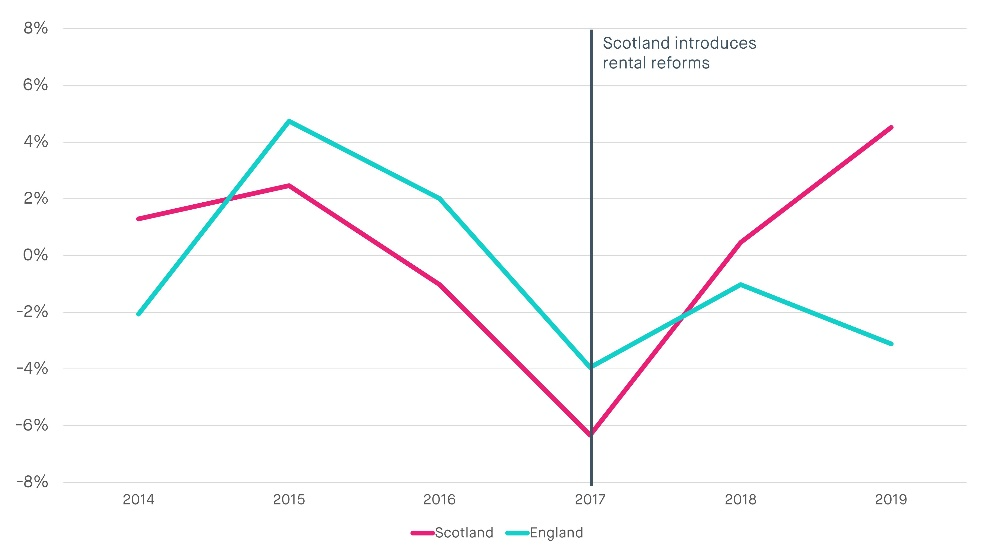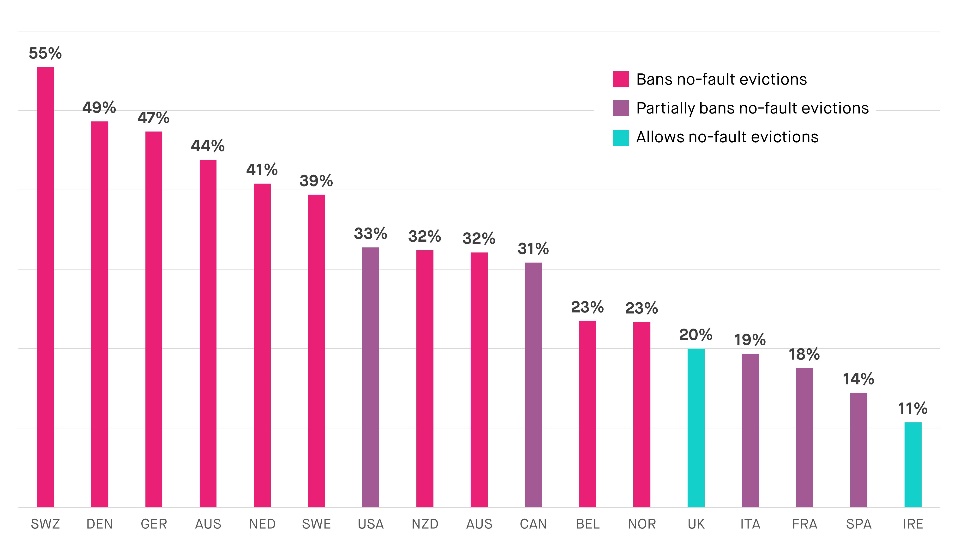Think tank highlights Scotland in defence of no-fault evictions ban

Housing secretary Michael Gove risks renters’ rights and wellbeing by delaying a ban on no-fault evictions based on false claims that Britain’s rental sector would collapse, a cross-party think tank has warned.
International evidence and Scotland’s experience of banning no-fault evictions shows that the measure would not harm the rental sector by prompting landlords to leave the market, and might actually enable it to grow said the Social Market Foundation.
DLUHC secretary Michael Gove’s delayed the Conservative’s 2019 commitment to ban no-fault evictions, which currently allow landlords to evict tenants without establishing faults. Multiple Conservative MPs claimed that banning the practice would cause landlords to exit the market, decreasing the supply of rental housing at a time of high demand. Through the King’s Speech, the Government confirmed that Section 21 “no-fault” evictions will not be brought in until a new court process and stronger possession grounds for landlords are in place.
Yet SMF analysis of other places that have ended no-fault evictions found little evidence to suggest it had a negative effect.
It said while the Scottish Parliament effectively banned no-fault evictions in 2017, its private rented sector grew at a faster rate between March 2018 and March 2020 than England’s. The two had been following similar trends up to that point.
According to the SMF, this is especially striking as Scotland’s ban on no-fault evictions occurred at the same time as large-scale protections for renters were introduced. In comparison to Gove’s plan, these changes made renting far more burdensome for landlords, yet were followed by an expansion of the market.
In 2019, Scotland saw its private rented sector grow at its fastest rate since 2011, while England’s continued to shrink.

Percentage increase in the share of households which are rented privately (Source: Scottish Household Survey and English Housing Survey)
The SMF also looked at evidence from other similar economies to the UK that have some kind of restriction on no-fault evictions.
European countries that ban no-fault evictions tend to have a larger private rented sector. Switzerland, Denmark, Germany, Austria, and the Netherlands all have twice as large a rented sector as the UK while banning no-fault evictions.
Within United States and Canada, which also have larger rented sectors than the UK, the practice is often banned by states or provinces, for example in California and Quebec.
Italy, France and Spain have smaller private rented sectors than the UK, and allow for no fault evictions in specified circumstances, such as when the landlord moves into the property. Ireland, the only large European economy that allows no-fault evictions, has one of the smallest rental sectors.
This may be self-reinforcing: as a country gets more renters, their voice grows stronger allowing them to lobby for greater protections which further increase demand, the SMF said.
Gideon Salutin, SMF researcher, said: “The argument that the rental sector will contract under regulations which protect renters is based on faulty economics which ignore the role renters play in the market.
“There appears to be no correlation between an increase in rental protections and a decrease in rental properties. In fact, the opposite may be true, as stronger protections attract more renters, increasing demand and normalising renting over the long term.”

Share of households in the private rented sector by country and eviction regulations (Source: OECD Housing Market Database)
The report comes as new figures show that 8,747 people in England and Wales were served with a Section 21 or a ‘no-fault’ eviction notice – which is a 32% increase (an increase of 2,131 households) from this time last year.
The Mortgage and Landlord Possessions statistics, from the Ministry of Justice, cover the period July to September this year.
The figures also show:
- Since the last quarter (April-June 2023), there has been a 13% increase in Section 21 eviction notices served.
- The number of actual evictions carried out by bailiffs for Section 21s increased by 31%.
- Overall, the number of eviction claims made between July and September 2023 increased by 19% to 24,938.
- The number of overall eviction notices served have increased across all regions. In London alone, 8,014 eviction notices were served which is an increase of 35% from this time last year.
Matt Downie, chief executive of Crisis, said: “Yet again, we see evidence of the insurmountable pressures placed on renters because of soaring rents and the cost of living crisis. With each eviction notice served comes the stress of finding somewhere else to live. In many cases, there are simply no affordable homes available.
“While the Westminster Government reaffirmed its commitment to scrap no fault evictions in the King’s Speech earlier this week, we are seriously concerned that these won’t be abolished fully until reforms to the court system take place, which may take years. Tenants must not be punished because the courts aren’t functioning properly. The Government must give struggling renters the protections they need to ensure more and more people aren’t pushed into homelessness.
“Ahead of the Autumn Statement, we urgently need the Westminster Government to invest in housing benefit so that people across Great Britain can afford even the cheapest of rents. On top of this, it’s vital they set out a plan to deliver the social homes we so desperately need.”








